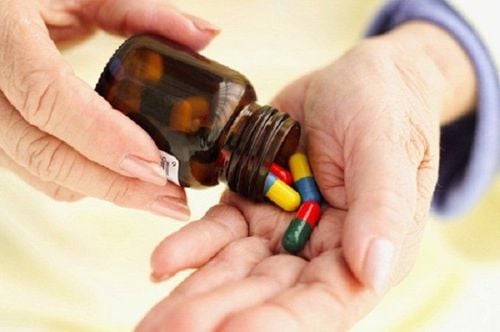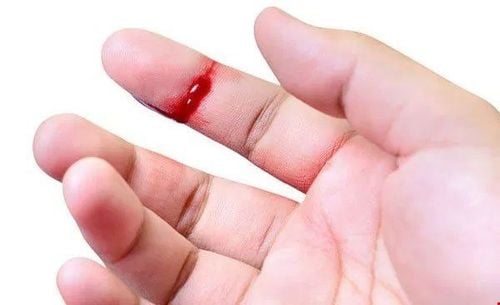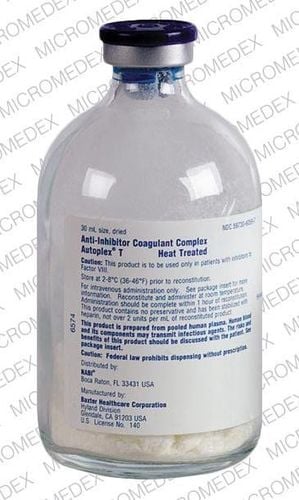This is an automatically translated article.
Hemophilia (blood clotting disorder, hemophilia) is a dangerous genetic disease that not only threatens the patient's life but also increases the mental and economic burden on the family and society. Hemophilia gene mutations are the cause of hemophilia.1. Overview of hemophilia
Hemophilia is an inherited blood clotting disorder caused by a deficiency of factor VIII and factor IX - factors necessary for the formation of blood clots.People with hemophilia bleed even without trauma, and spontaneous bleeding recurs many times. If not treated adequately, after bleeding episodes, the patient's muscles and joints will be deformed, leading to permanent disability, causing difficulties in living and working. If bleeding in dangerous areas such as the brain, neck, mouth, ... is not stopped in time, the patient can die.

Người bị Hemophilia bị chảy máu ngay cả khi không bị chấn thương và hiện tượng tự chảy máu tái diễn nhiều lần
2. How does hemophilia gene mutation cause hemophilia?
The birth of a boy or a girl is determined by a pair of sex chromosomes. In boys, the sex chromosome pair is XY, in girls it's XX. This pair of chromosomes in the baby receives 1 chromosome from the father and 1 chromosome from the mother. Each chromosome contains many genes that regulate body functions. In addition to its function of sex regulation, the X chromosome also contains genes that allow the production of clotting factors VIII and IX. In patients with hemophilia, these genes are damaged, so they do not produce enough factors VIII and IX for clotting.Females only contain 1 X chromosome, so hemophilia will not manifest but will pass the disease gene to their children. With each pregnancy, a mother carrying the hemophilia gene (with 1 X chromosome carrying the disease gene) has the ability to pass on the gene to the next generation with a ratio of 1:2. A son with an XY chromosome set has a 50% chance of inheriting the disease gene from his mother and will manifest the disease. A daughter with an XX chromosome has a 50% chance of receiving the disease gene from her mother and becoming a healthy carrier.
If the father has hemophilia and the mother is normal, all the daughters will carry the hemophilia gene. The son of this person will be healthy and normal and will not pass the disease on to the next generation. In case both parents carry the hemophilia gene, the daughter has a 50% chance of inheriting both the disease gene from both parents and manifesting the disease. This is a particularly important case to keep in mind when marrying close to blood. Because of this, the disease is common in men with an incidence of 1: 5000 newborn boys. Women rarely get the disease because the probability that both parents carry the disease gene is very low.
A woman is definitely carrying the disease gene when:
Has a father with hemophilia; Have at least 2 sons with hemophilia; Has 1 son with hemophilia and has a brother, uncle or a blood related man with hemophilia. A woman is likely to carry the disease gene when:
Has at least 1 relative with hemophilia but no children with hemophilia; Has 1 son with hemophilia and no other family member has the disease. In particular, hemophilia is a genetic disease, but still about 30% of patients have undetectable genetic properties. These cases are considered to have the disease due to a mutation that turns a normal gene into a disease gene. The danger is that this disease gene will be passed on to the next generation.
3. Prevention and living with hemophilia

Người bệnh máu khó đông nên thay đổi lối sống phù hợp với bệnh, đi đứng nhẹ nhàng, tránh chấn thương khiến chảy máu
Currently, there is no definitive treatment for hemophilia. Therefore, patients need to be careful in daily activities with the following notes:
Patients with hemophilia should change their lifestyle in accordance with the disease, walk gently, avoid injuries that lead to bleeding; Create a safe living environment, need to wear a helmet when going out on the street, slippery places in the house need handrails, enough light to avoid falling; Clean oral hygiene, periodical check-ups, prevention of oral infections to minimize the risk of bleeding due to periodontal disease; Exercise regularly to strengthen muscles, reduce the risk of bleeding; Avoid taking medications that can cause bleeding such as aspirin, histamine, no intramuscular injection, no acupuncture; When bleeding, you need to go to a medical facility immediately to be treated for the wound. Hemophilia is an inherited disease caused by genetic mutations, which can be prevented by prenatal diagnosis and screening for subjects at high risk of passing on genes to the next generation. Therefore, couples who carry the disease gene or have a close relative with the disease should undergo pre-marital genetic testing to look for the mutation that causes hemophilia.

Các cặp vợ chồng mang gen bệnh hoặc có người thân mắc bệnh nên thực hiện xét nghiệm gen tiền hôn nhân
Fertility, sexual and reproductive health screening, screening for diseases sexually transmitted infections, screening for genetic diseases (including hemophilia), counseling on reproductive and contraceptive methods (if necessary) for couples before getting married; Early detection of causes that can lead to infertility, infertility; Advice on the best time to give birth and measures to give birth to healthy and intelligent children for couples preparing to have children.
Please dial HOTLINE for more information or register for an appointment HERE. Download MyVinmec app to make appointments faster and to manage your bookings easily.
Reference source: National Institute of Hematology - Blood Transfusion












